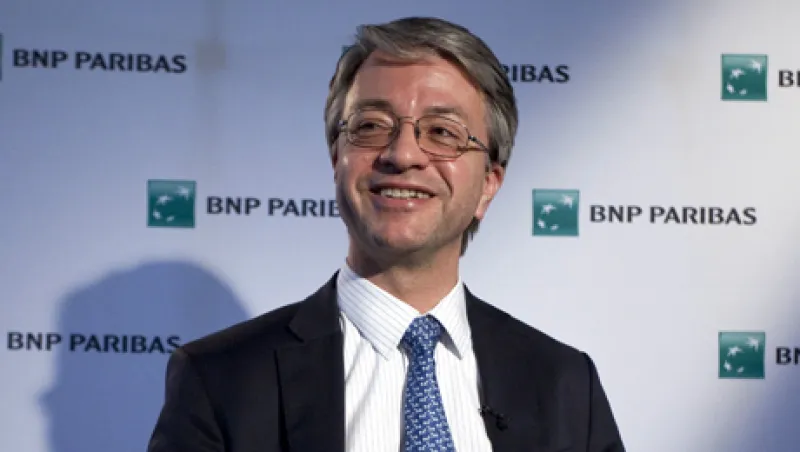BNP Paribas CEO Jean-Laurent Bonnafé is confident about the bank’s prospects for the second half of the year after revealing better-than-expected second-quarter results.
On August 2, the euro zone’s biggest bank by assets reported Q2 net income of €1.85 billion ($2.27 billion), 13 percent down from the same period last year but above most analysts’ forecasts. Revenues were down 8 percent to €10.1 billion. The group also said it was close to reaching its Basel III target of a 9 percent Tier 1 capital ratio, some six months ahead of schedule, having achieved 8.9 percent as of June 30.
Bonnafé, who took charge of the bank in December 2011 when he succeeded current chairman Baudoin Prot, said in an interview with Institutional Investor that he wasn’t alarmed by the euro zone’s economic problems. “What we are seeing is not a deep recession, but rather a lack of economic growth, while the core markets are relatively strong,” Bonnafé said. “I am optimistic that conditions will eventually improve, however slowly, because the situation is fairly manageable.”
Delphine Lee, European banks analyst at J.P. Morgan in Paris, described the results as “solid” in a note to clients. She observed that the bank was funding well in a difficult environment, having met more than 100 percent (€22 billion as against €20 billion) of its refinancing needs for the year, principally through private placements rather than bond issues.
Amid the euro zone crisis, analysts and investors are keeping a close watch on BNP Paribas’s exposure to sovereign bonds, but Bonnafé points out the exposure is coming down steadily, while holdings of Greek and Spanish bonds are minimal.
The bank’s total euro zone sovereign debt exposure fell from €73.9 billion at the end of June 2011 to €40.7 billion a year later. Spanish bond holdings fell from €2.7 billion to €0.3 billion, while Greek holdings were reduced from €3.5 billion to €0.2 billion. Italy, however, has also struggled in the bond markets and BNP Paribas still had a substantial holding of €11.2 billion of Italian bonds at the end of June 2012, though it’s down from €20.5 billion a year earlier. The bank says it wants to limit sovereign debt exposure to any one country to around €10 billion.
While revenues from the bank’s retail division were flat at €6.26 billion, they fell by nearly 24 percent in the corporate and investment banking (CIB) division to €2.23 billion in Q2. Profits in CIB, which is led by Alain Papiasse, slid by 40 percent to €821 million.
The group confirmed that its deleveraging plan, to cut risk-weighted assets by 10 percent or €79 billion by the end of 2012, was nearly complete with €70 billion having been shed as of June 30. Along with other French banks, BNP Paribas faced a liquidity squeeze last year as U.S. money market funds pulled back from Europe, although the bank says the deleveraging plan had been initiated before the squeeze began.
BNP Paribas shares initially rose slightly after the results announcement, but fell by 4 percent on August 2 to €29.45 as the market expressed its disappointment that the European Central Bank would not immediately intervene in the sovereign debt markets.
The bank is so far completely untouched by the Libor-rigging scandal that has tainted banks such as Barclays, Royal Bank of Scotland and Deutsche Bank.






